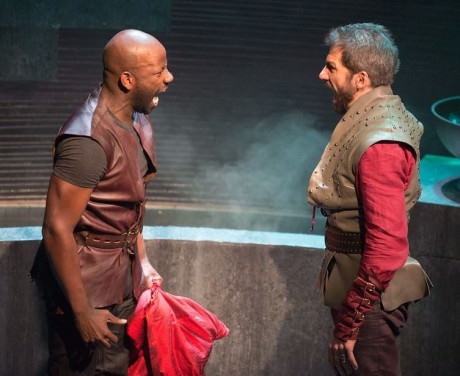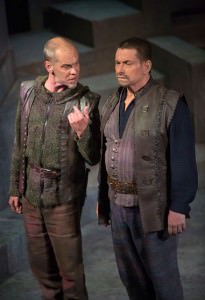Let’s be provocative in this column.
Let’s imagine a world where the debates within Shakespeare’s Julius Caesar are not between ambitious political people like Brutus, Mark Anthony, Cassius, and Julius Caesar; but one between, say, ambitious entrepreneurs like Facebook’s Mark Zuckerberg and Twitter’s Jack Dorsey over information and trending topics and news and how to influence a crowd into taking action? Or one about “Big Data” or Crowd-Sourcing to make critical life-altering decisions? Not so far-fetched, as you will see in a moment.

And there is even a connection to Shakespeare’s “Julius Caesar now at the Folger.

First this about Robert Richmond’s vision for his production of “Julius Caesar.” I do come to praise it! There is nothing static, stagnant or limp about Director Richmond’s take on Shakespeare’s Julius Caesa.” Let’s hope that younger audiences less seeped in theater and history can and will find their way to the production.
Classicists be aware. Richmond has the cajones to move the production through centuries of time; not staying in one particular time period. He has his Julius Caesar move from ancient Rome in Act I, to a Flander’s Field-like WW I setting in Act II including gas-masks wearing soldiers and a stage strewn with red poppies for the departed. He also employs multi-cultural casting for his 12-member ensemble. His casting sets- up some nifty dynamics, if one agrees that casting choices are made for reasons not limited to acting skills.
Richmond’s Julius Caesar has a grainy texture to its historical grimness. It is full of manly discord and dissent. These are men willing to buck trends and take risks, including with their own lives. How refreshing. But make no mistakes, the characters depicted are the one-percent of honorable men who control the Roman world. They bicker, conspire and murder for reasons such as petty jealousy or the rightful form of government. But they are still the one-percent. They are like an oligarchy of stock-holders owning a country rather than a business. This is a world of human beings and not computers driven by algorithms. The characters are swayed by flattery even as they try to manipulate everyone else to their side.
All is muddiness in Caesar’s world. Loving wives are given short shrift. Everywhere is deception. Once the dogs of war are let loose, the future is unknown. Soothsayers have no sway. But one must admit, the men Shakespeare portrays – ah, they do not shrink away even when the news becomes dreadful and the culture of the times regards fatal actions.
So, now let’s go back to the opening paragraph of this column. I came across an item in the October 31, 2014, Washington Post from Gary Shapiro, president and chief executive of the Consumer Electronics Association (CEA), the U.S. trade association representing consumer electronics companies. He was writing about “interpersonal assessment technology” with promises to make life easier.
“One thing is for sure: politics is in for a major overhaul. With every Smartphone possessing a virtual lie-detector test, elected officials will need to be creative in the ways they talk to us. In fact, my fear is the most insecure and most powerful politicians will resist, and quickly seek to regulate or restrict these technologies — ignoring their obvious good — in a hidden but discoverable attempt to preserve their own power and half-truths.”
Let your writer note that Louis Butelli took your writer’s breath away as a wily, feral, wicked, electric, “lean and hungry” Cassius. There was a person there; even as his character’s flaws are apparent; untrustworthy, jealously-driven and self-centered. Butelli is John Malkovich in the flesh One can easily seem him seducing others. And he even wept at the death of Brutus’s wife Portia; something Brutus was not able to do. Now what kind of man doesn’t weep at his own wife’s suicide?

Michael Sharon as Julius Caesar comes across an imperious, strutting, Mussolini -like presence. He is full of arrogance with a “you can’t touch this” personality. He is a Caesar who is stiff and self-important believing he could bend others to his will. Anthony Cochrane as Brutus reminds your essayist of a past U.S. politician who when asked what he would do if his wife was raped, froze and showed no emotion. Really? Cochrane plays his role as a solid man, but too often living in his head though swayed by sweet words. Maurice Jones, making his Folger Theatre debut, is Caesar’s closest ally, Mark Antony. Jones is a powerful, agile whip-smart presence whether giving oratory to a restless crowd or as a general hurling put-downs and insults to his enemies in a game of snaps.
Shirine Babb as Portia, the doomed wife of Brutus and Deidra LaWan Starnes as Caesar’s wife Calphurnia bring deep, deep presence to their roles of women “dissed” merely because they were women.
Richmond’s production is anchored by a set designed by Tony Cisek, a multi-Helen Hayes Award recipient. It is stately and imperial for Act I. There is a glowing cauldron at center stage with steam rising as if mimicking an active Hawaii volcano. The set is visually interesting with its minimalist masculinity. Jim Hunter’s moddy lighting design is a murky gray punctuated by hot white lights or spooky flickering lighting on characters as they speechify. The music composition and sound design by Eric Shimelonis is funereal and mood setting. The most visual arresting costuming from Mariah Hale include shroud encased walking ghosts as well as WW I dough-boys in Act II.
“There is a tide in the affairs of men, Which, taken at the flood, leads on to fortune.”
Soon perhaps an app to sort it all out with Shakespeare’s Julius Caesar as to when the tide and flood are right to take action. Along with “Big Data” built upon underlying algorisms developed by an chattering, invisible few, making a fictional Big Brother look weak and limpid. Ultimately decisions will still be made upon faulty, though more copious, data and bad intelligence But without the beating hearts of a Cassius, Brutus, Mark Anthony and Caesar, people at least willing to stand up and risk all including their lives and fortunes. Which do we want?
Running Time: Approximately 2 hours, with one 15-minute intermission.
Julius Caesar plays through December 7, 2014 at Folger Theatre at the Folger Shakespeare Library—201 East Capitol Street, SE, in Washington, DC. For tickets, call the box office at (202) 544-7077, or purchase them online.
LINKS:
Review of Julius Caesar by Sophia Howes on DCMetroTheaterArts.
In the Moment: “Julius Caesar’ at Folger Theatre (review) on DCMetroTheaterArts by David Siegel.
Spine: ‘Julius Caesar, “et tu Brute?” and You’ by Robert Michael Oliver on DCMetroTheaterArts.





